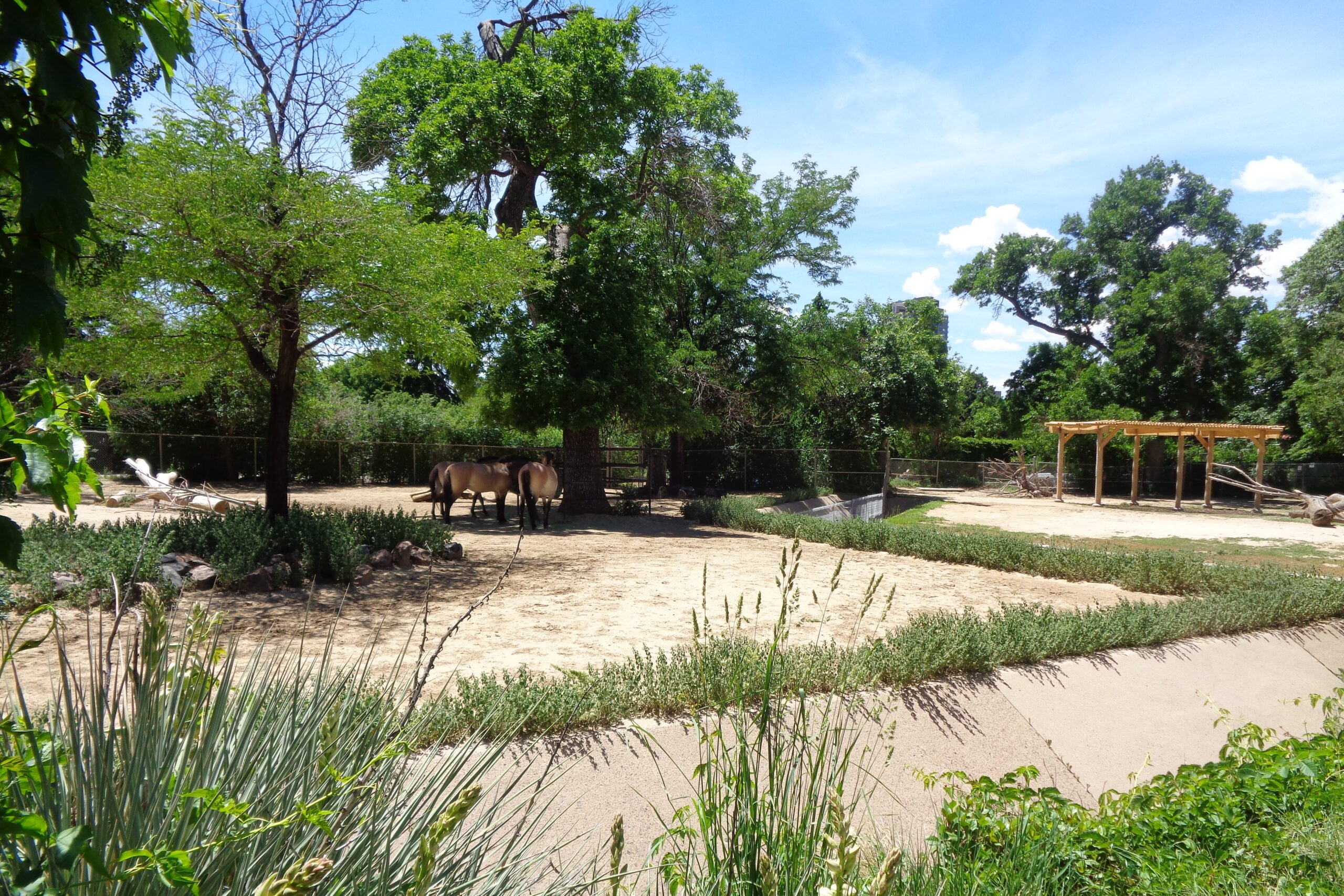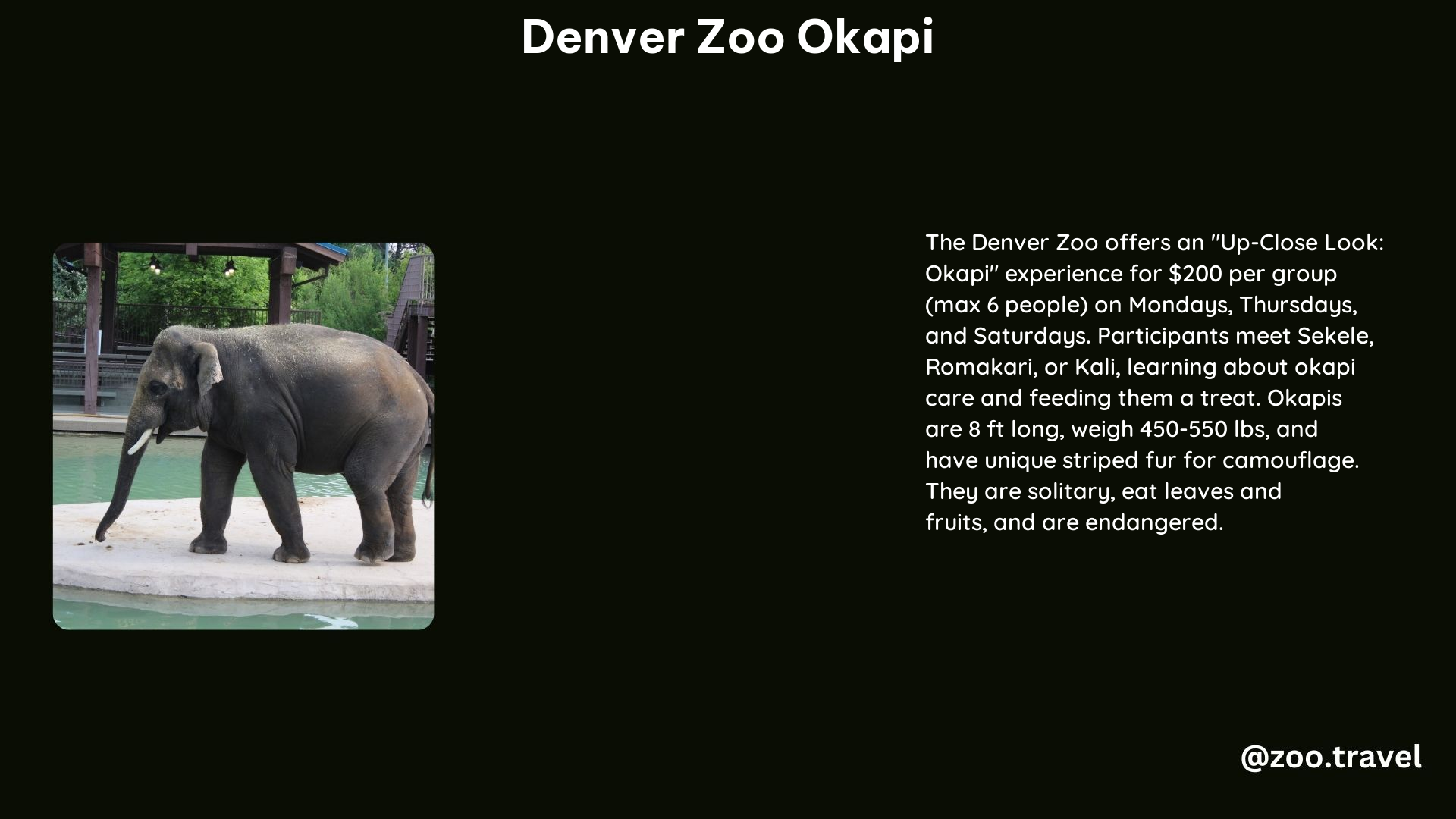The Denver Zoo is home to a unique and captivating animal, the okapi. As a relative of the giraffe, the okapi is a true wonder of nature, with its striking black and white striped legs and velvet-like dark brown fur. In this blog post, we’ll dive deep into the world of the Denver Zoo okapi, exploring its physical characteristics, habitat, social behavior, and the exciting Up-Close Animal Encounter experience offered at the zoo.
Physical Description and Adaptations of the Denver Zoo Okapi

The Denver Zoo okapi is a truly remarkable creature. Standing up to six and a half feet tall at the shoulder, these animals can weigh between 450 to 550 pounds, with females being larger than males. Their long, flexible tongues, which can reach up to 14 inches in length, are a unique adaptation that allows them to grasp and manipulate leaves, buds, and other vegetation in their forest habitat.
One of the most distinctive features of the okapi is its striking color pattern. Their dark brown, velvet-like fur is adorned with horizontal white stripes on their legs and rear, which helps them blend seamlessly into the shadows of the dense Ituri rainforest. Additionally, male okapi have two small, skin-covered horns called “ossicones” on their forehead, adding to their unique and captivating appearance.
Habitat and Diet of the Denver Zoo Okapi

The okapi is found exclusively in the Ituri tropical rainforests of the Democratic Republic of Congo, located in central Africa. These forests, which range in altitude from 1,640 to 3,280 feet, provide the perfect environment for the okapi to thrive. In the wild, these animals feed on a diverse diet of leaves, buds, grasses, ferns, fruit, and fungi.
At the Denver Zoo, the okapi are provided with a carefully curated diet that includes hay, grain, vitamin and mineral supplements, and occasional fruit treats to ensure they receive all the necessary nutrients to maintain their health and well-being.
Social Organization and Life Cycle of the Denver Zoo Okapi
Okapi are generally solitary animals, with the exception of mating pairs and females with their calves. Females reach sexual maturity at around three years of age, and after a gestation period of 14 months, they give birth to a single calf weighing between 30 to 65 pounds.
In the wild, the lifespan of an okapi is difficult to determine, but in captivity, these animals can live between 15 to 20 years, thanks to the dedicated care and attention provided by the staff at the Denver Zoo.
Up-Close Animal Encounter at the Denver Zoo
For those who want to get an even closer look at these fascinating creatures, the Denver Zoo offers an exciting Up-Close Animal Encounter with the okapi. This 30-minute experience allows visitors to meet and interact with a member of the okapi herd, guided by a knowledgeable zoo staff member.
The Up-Close Animal Encounter is available on Mondays, Thursdays, and Saturdays, and costs $200 per group (with a maximum of 6 people). Participants must wear face coverings or masks, use provided hand sanitizer, and be at least six years old. Closed-toed shoes are also recommended for this experience.
Conservation Status of the Denver Zoo Okapi
The okapi is classified as an endangered species by the International Union for Conservation of Nature (IUCN). This is due to a variety of threats, including habitat loss, poaching, and civil unrest in their native range. The Denver Zoo, along with other zoos and conservation organizations, plays a crucial role in raising awareness and supporting efforts to protect this unique and fascinating animal.
Interesting Facts about the Denver Zoo Okapi
- The okapi is closely related to the giraffe, sharing characteristics like skin-covered horns and a long, prehensile tongue.
- The okapi’s distinctive color pattern helps it blend seamlessly into the shadows of the rainforest, making it difficult to spot.
By visiting the Denver Zoo and experiencing the Up-Close Animal Encounter with the okapi, you’ll have the opportunity to learn more about this remarkable species and the important conservation efforts being made to protect it. Don’t miss your chance to get up close and personal with these unique and captivating creatures!
References
- https://denverzoo.org/animals/okapi/
- https://gazette.com/denver-zoos-newborn-okapi-member-of-endangered-african-species-receives-cross-country-transfusion/article_a809bd99-66cb-5fde-891b-4ab8158cca90.html
- https://denverzoo.org/up-close-look-okapi/
